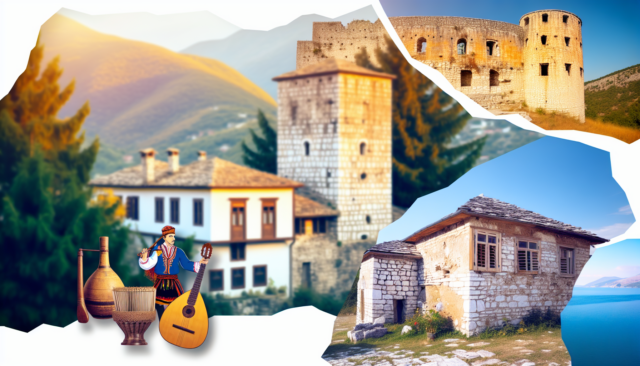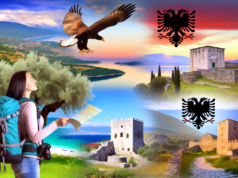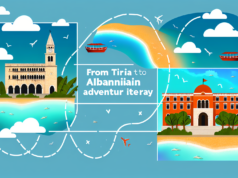
Nestled in the heart of the Balkans, bordered by Montenegro to the northwest, Kosovo to the northeast, North Macedonia to the east, and Greece to the south, Albania is a country often overlooked by travelers. However, this small nation, with its stunning landscapes, rich history, and vibrant culture, offers a unique experience for those willing to explore its depths. In recent years, Albania has started to emerge as an appealing destination, revealing the treasures of its past while forging a path toward a dynamic future.
A Tapestry of History
Albania’s history is as diverse as its landscape, which ranges from picturesque beaches along the Ionian Sea to rugged mountains in the north. The country has been a crossroads of civilizations, influenced by Greek, Roman, Byzantine, and Ottoman empires. The ancient city of Apollonia, founded in the 6th century BC, showcases the remnants of Hellenistic culture, including impressive ruins and an archaeological museum that narrates the story of its illustrious past.
Another significant site is the UNESCO World Heritage town of Gjirokastër, famed for its well-preserved Ottoman architecture and stone houses, known locally as "the City of Stone." The town is also the birthplace of the acclaimed Albanian writer Ismail Kadare, whose literary contributions have brought international attention to the region. Gjirokastër stands as a testament to the synthesis of the various cultures that have influenced Albania over the centuries.
Meanwhile, the coastal town of Butrint, also UNESCO-listed, was once a thriving Roman port. Its archaeological site reveals layers of history, from Greek temples to Roman theaters, all nestled within a stunning natural park that highlights the region’s biodiversity. Visitors can wander through the ruins while enjoying vistas of the surrounding lagoons and unspoiled landscapes.
The Cultural Mosaic
Albania’s culture is a dazzling mosaic of traditions, languages, and customs, reflecting its complex history and diverse influences. The country’s official language is Albanian, a unique branch of the Indo-European language family that has shaped many regional dialects and expressions. Traditional music, with its distinctive polyphonic style, plays a significant role in Albanian heritage. Songs often tell stories of love, history, and the struggles of the Albanian people, frequently accompanied by traditional instruments such as the çiftelia and the lahuta.
Culinary tradition is also a cornerstone of Albanian culture. Dishes such as byrek (savory pie) and tavë kosi (baked lamb with yogurt) showcase the country’s agricultural abundance and cultural influences from the Mediterranean and Middle Eastern cuisines. Albanian hospitality is renowned, and visitors are often welcomed with open arms, a cup of strong coffee, or a glass of raki—an anise-flavored moonshine that is a staple in many homes.
The Albanian traditions are rich and varied, with folklore permeating daily life. Celebrations such as the Dita e Verës (Summer Day) mark the arrival of spring and are celebrated with festivities that include music, dance, and traditional foods. Meanwhile, the Bektashi Order, a mystic branch of Islam, is unique to Albania, promoting spiritual dialogue and tolerance among the country’s diverse population.
The Natural Splendor
No exploration of Albania is complete without delving into its breathtaking natural environment. The Albanian Riviera boasts some of the most beautiful beaches in Europe, with crystal-clear waters and stunning cliffs that rival the best in the Mediterranean. Destinations such as Dhërmi and Jale Beach are becoming popular among sun-seekers looking for pristine shores away from the crowded coasts of more well-trodden tourist spots.
Inland, the diverse geography offers endless opportunities for adventure. The Albanian Alps, known for their rugged beauty and pristine landscapes, are a paradise for hikers and nature lovers. The Valbona Valley National Park and the Accursed Mountains provide impressive trekking routes that lead to remote villages where visitors can experience authentic Albanian mountain culture.
Nature enthusiasts will also find a rich array of biodiversity in the country’s numerous national parks, such as the Divjakë-Karavasta National Park, home to one of Europe’s largest lagoons and a diverse range of bird species, including the rare Dalmatian pelican.
Conclusion
Albania is a country that invites exploration with its combination of rich history, vibrant culture, and stunning natural landscapes. As it continues to evolve, the nation opens its doors to the world, ready to share its untold stories and hidden gems. For travelers looking for a genuine experience that blends captivating history with warm hospitality and breathtaking scenery, Albania is indeed a destination that promises to unveil countless treasures. Whether one is wandering the ancient streets of Berat, hiking through the majestic peaks of the Alps, or enjoying a meal in the vibrant capital of Tirana, there is no doubt that Albania is a place where the past and present intertwine beautifully, forever leaving an imprint on the hearts of those who visit.













